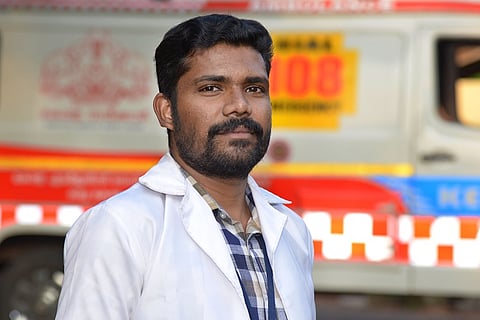

On the night of November 8, Akhil got a frantic call from the husband of a pregnant woman. The 27-year-old nurse, who is a health care provider working as part of the 108 ambulance service in the Thiruvananthapuram suburb of Kallara, rushed to the spot along with the ambulance driver.
The ambulance was not called to a house, but to a road where the pregnant woman lay in pain, with her husband frantically hoping that help would arrive soon.
The nearest hospital was a 40-minute drive away from the spot, and Akhil realised that the woman had already gone into labour and that even shifting her to the ambulance was risky. Around midnight, Akhil helped the woman from Nepal – the wife of a migrant worker – deliver her first child on the road.
For Akhil, this isn’t a one off experience. Considering Kallara is a remote suburb of Thiruvananthapuram, and considering that the nearest hospital is a 45-minute ride away, Akhil has had to step in multiple times to help pregnant women with childbirth.
In fact, this was the 13th time in seven years that Akhil helped a woman deliver her baby en route to a hospital. Ten of these instances happened inside the ambulance.
The ‘delivery ambulance’
A native of Kollam district, Akhil has been working for the 108 ambulance in the area for the past seven years. Prior to this, he worked at a hospital for over a year.
For Akhil, each passing day is a challenge that gives him satisfaction that he can directly be of help to ailing patients.
Speaking to TNM, he distinctly remembers the first time he had to help with the delivery of a baby around a year into his job as an ambulance nurse.
"We have a central call centre where all the calls are directed to, and they connect the call to the nearest ambulance. When I received the call, I realised that it was from a 4-year-old girl child who told me that her pregnant mother was in pain. I have no clue how she could call us, but the child correctly told me her address and said that there was no one at home. Once there, we realised that the road was too narrow for the ambulance to go. We walked to their house, which was at least half a kilometer away. When I checked, the baby's head could be seen and there was no way the mother could be shifted to the ambulance in that state. That was the first time I helped with a delivery. After that, we rushed the mother and the newborn to the hospital," Akhil says.
His joy increased manifold when the woman's family called Akhil to the hospital room to show him the newborn he had helped deliver.
In the last four years, Akhil has delivered more babies inside the ambulance, so much so that the people in the area fondly refer to the ambulance as ‘the delivery ambulance’.
Delivering siblings, two years apart
While Akhil's relationship with the patients he helps transport to the hospital is limited to the one-hour of travel time, he was pleasantly surprised when he met the same patient a second time.
"Some two years ago, I had helped this woman deliver her first baby inside the ambulance while we were on our way to the hospital. We pulled over the ambulance and conducted the delivery. Recently, I was rushing a pregnant woman and her husband in the ambulance, and they told me that I had helped deliver their first child. This time too, the woman went into labour before we reached the hospital and I helped deliver the baby. That was a one-time experience I think," Akhil laughs.
Being a male nurse
While he has helped many get to the hospital on time, being a male nurse who helps women deliver their children comes with its own problems, he points out.
There have been instances where the pregnant woman or her family have denied Akhil permission as well.
"There is a stigma associated with this, there have been cases where the pregnant women refused to let me examine them. In some cases, while the woman was willing to, the people around her have refused,” he says.
“This one time, the woman's mother-in-law objected to me examining the woman, and despite trying to convince her that the mother and the baby could be at risk if the delivery does not happen within minutes, she did not budge. I later learnt from the hospital that it led to complications in her delivery,” he recalls.
(All photographs by Sreekesh Raveendran Nair)